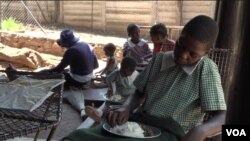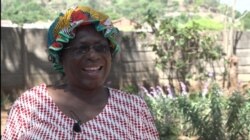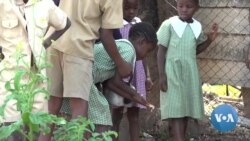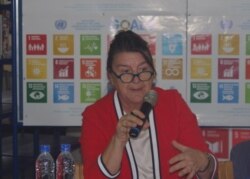A U.N. official is warning that Zimbabwe is on the brink of starvation, with millions facing food insecurity.
Hilal Elver, U.N. special rapporteur on the right to food, said Thursday that the government must reduce Zimbabwe's dependence on imported food and increase self-sufficiency to counter effects of the struggling economy and recurring drought.
Orpah Chiwashira, founder of Faith Community Support, a charity that provides meals to those in need, said Zimbabwe's struggling economy was taking a toll.
"In the last two months, the organization that gives me 200 kilograms of maize meal per month has been struggling,” Chiwashira said in Kambuzuma, one of Harare’s poorest townships, where Faith Community Support was providing a group of orphans with their only meal of the day. “They didn't have any maize meal to give us. So, we have to buy maize meal to be able to feed the children. For December, I don't even know — maybe we will get a meal, maybe we won't."
Elver told reporters in Harare that Zimbabwe was facing its worst food shortage in years, with 60 percent of the population food insecure and 5.5 million people dependent on food aid.
"Child deaths from severe malnutrition have been rising in the past few months,” she said. “Ninety percent of Zimbabwean children aged 6 months to 2 years are not consuming the minimum acceptable diet."
Elver, wrapping up an 11-day visit to Zimbabwe, said the country was on the brink of man-made starvation.
"Why I say man-made? … Something happened. Not from the nature but from mismanagement, political and conflictual issues that bring people to starvation,” she said. “It comes from a dysfunctional system. Yes, drought is not man-made, but if there is good management, it is possible to survive even during the drought periods, which neighboring countries did. Zimbabwe used to do it historically, in earlier periods."
Elver called on the Harare government to increase food production to avoid shocks from the shrinking economy and recurring drought. She warned that food insecurity and land mismanagement were increasing the risk of civil unrest.
Mthuli Ncube, Zimbabwe's finance minister, said the government was working to address the threat from food insecurity.
"Given the drought, we need to climate-proof our agriculture, so investment in infrastructure for evacuation of water from dams is absolutely critical,” Ncube said. “That's why in the [2020] budget you find this large allocation for agriculture around the infrastructure investment. Because, without this irrigation, then we are exposed to climate change. And we need to deal with that."
Meanwhile, what once was the breadbasket of Africa has become dependent on food aid, and the most vulnerable in Zimbabwe — like orphans whom Chiwashira feeds — are left guessing when they will get their next meal.









